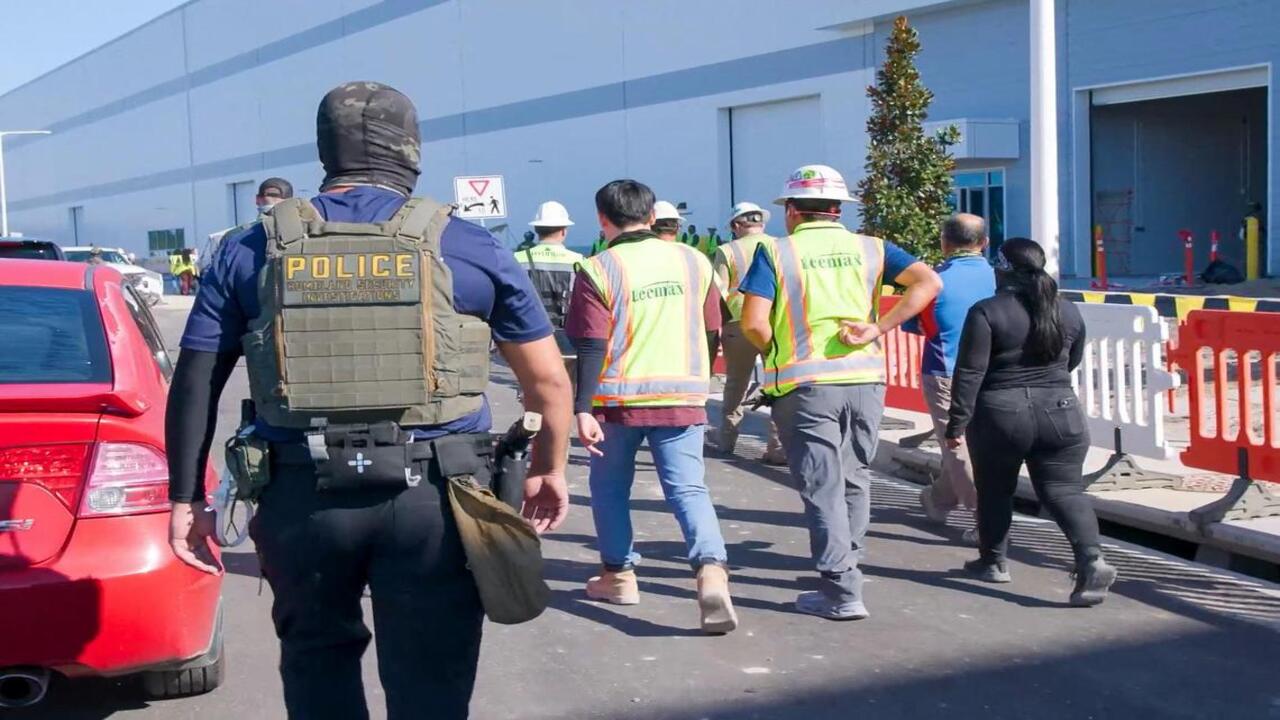
IndependentReport – The recent immigration raids carried out by U.S. federal authorities at construction sites in Georgia have created a storm of reactions across industries. More than 400 officers from the Department of Homeland Security and Immigration and Customs Enforcement (ICE) were deploy in what officials described as Operation Low Voltage, the largest workplace raid of its kind in American history. The operation targeted workers at facilities linked to Hyundai and LG Energy Solution, two South Korean giants in the automotive and battery industries.
Reports confirm that around 475 individuals were detaine, with the majority being South Korean nationals, although workers from other countries, including Indonesia, were also among those taken into custody. Many of those arrested allegedly overstayed their visas or lacked proper work authorization. For South Korea, this incident has become more than just a legal matter it is now seen as a political and economic setback in the country’s ambitious strategy to expand its footprint in the United States.
The timing of the raid could not have been more striking. Only months earlier, South Korean leaders and corporate executives announced billions of dollars in commitments to American projects, particularly in green technology, semiconductors, and electric vehicle supply chains. These investments, value at nearly USD 350 billion, were frame as a cornerstone of stronger U.S.–Korea economic relations.
However, Immigration raids in US casts doubt on the security of these plans. Investors are now questioning whether the U.S. remains a stable and reliable environment for South Korean capital. Early reports suggest that LG Energy Solution has even consider delaying parts of its battery plant development in Georgia, though company representatives insist that no official decision has been made. Regardless, the disruption signals growing unease among South Korean businesses that once viewed America as their most strategic overseas market.
On one hand, the U.S. government has actively courted foreign investment through subsidies and incentives for industries like renewable energy and electric vehicles. South Korean companies, eager to take advantage of the Inflation Reduction Act and other policies, committed large sums in response. On the other hand, the very same government has now demonstrated a zero-tolerance stance on undocumented or improperly documented workers, resulting in a conflict between economic incentives and immigration enforcement.
This contradiction is not lost on policymakers in Seoul. South Korea’s trade minister openly acknowledged the “concerns about the future of our investments in America after these raids.” The crackdown, though focused on labor violations, risks being interpret as a mixed signal that undermines the spirit of partnership that Washington has long sought to promote.
Read More : Nepal Lifts Social Media Ban Amid Youth-Led Anti-Corruption Unrest
The fallout from the raids has ripple effects beyond the immediate detentions. Several dimensions of impact can be identified:
These points highlight why the incident is not simply about immigration policy but also about the broader landscape of trade, diplomacy, and industrial cooperation.
The South Korean government responded swiftly. President Lee Jae Myung ordered emergency measures, while the Ministry of Foreign Affairs established a special task force to assist its nationals. Companies like Hyundai and LG Energy Solution also moved to clarify their positions. Hyundai emphasize that none of its direct employees were detaine, while LG confirmed that 47 staff members and more than 250 contractors were among those arrested.
International observers note that the Immigration Raids in US may serve as a warning to other foreign investors, not just South Korea. With immigration enforcement becoming a political priority in the U.S., companies relying on complex global labor arrangements could face greater scrutiny. For Seoul, the incident is both a diplomatic challenge and a test of how resilient its economic partnership with Washington will prove to be under stress.
Also Read : Alibaba Pushes Into the US With AI Agent Tariffs Can’t Stop This Giant
Looking ahead, the biggest question is whether this immigration crackdown will discourage further South Korean investments in America. While both governments have incentives to maintain strong ties given the strategic importance of supply chains, defense, and technology the episode may cause South Korean corporations to diversify their investment strategies. Markets in Southeast Asia or Europe could emerge as alternative destinations, reducing the dependence on the U.S.
For the United States, the challenge will be balancing its enforcement priorities with the economic benefits of welcoming foreign capital. Failure to strike this balance may jeopardize not only industrial growth but also diplomatic trust with one of its closest allies. Ultimately, the incident is a reminder that the intersection of labor policy, economic development, and foreign relations can be as delicate as it is decisive.
This Article About Immigration Raids in US Written by: Lukman Azhari | Editor: Micheal Halim
Information Source: Bloomberg.com